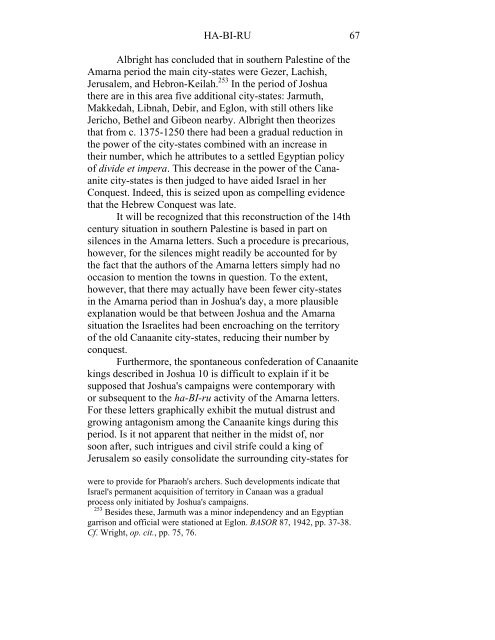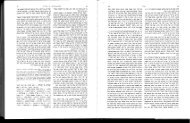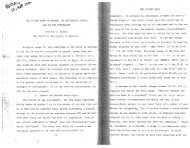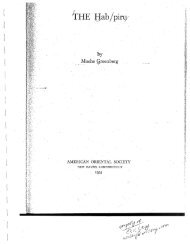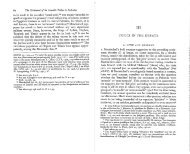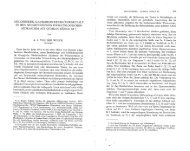The Ha-Bi-Ru--Kin or Foe of Israel? - Gordon College Faculty
The Ha-Bi-Ru--Kin or Foe of Israel? - Gordon College Faculty
The Ha-Bi-Ru--Kin or Foe of Israel? - Gordon College Faculty
You also want an ePaper? Increase the reach of your titles
YUMPU automatically turns print PDFs into web optimized ePapers that Google loves.
HA-BI-RU 67<br />
Albright has concluded that in southern Palestine <strong>of</strong> the<br />
Amarna period the main city-states were Gezer, Lachish,<br />
Jerusalem, and Hebron-Keilah. 253 In the period <strong>of</strong> Joshua<br />
there are in this area five additional city-states: Jarmuth,<br />
Makkedah, Libnah, Debir, and Eglon, with still others like<br />
Jericho, Bethel and Gibeon nearby. Albright then the<strong>or</strong>izes<br />
that from c. 1375-1250 there had been a gradual reduction in<br />
the power <strong>of</strong> the city-states combined with an increase in<br />
their number, which he attributes to a settled Egyptian policy<br />
<strong>of</strong> divide et impera. This decrease in the power <strong>of</strong> the Cana-<br />
anite city-states is then judged to have aided <strong>Israel</strong> in her<br />
Conquest. Indeed, this is seized upon as compelling evidence<br />
that the Hebrew Conquest was late.<br />
It will be recognized that this reconstruction <strong>of</strong> the 14th<br />
century situation in southern Palestine is based in part on<br />
silences in the Amarna letters. Such a procedure is precarious,<br />
however, f<strong>or</strong> the silences might readily be accounted f<strong>or</strong> by<br />
the fact that the auth<strong>or</strong>s <strong>of</strong> the Amarna letters simply had no<br />
occasion to mention the towns in question. To the extent,<br />
however, that there may actually have been fewer city-states<br />
in the Amarna period than in Joshua's day, a m<strong>or</strong>e plausible<br />
explanation would be that between Joshua and the Amarna<br />
situation the <strong>Israel</strong>ites had been encroaching on the territ<strong>or</strong>y<br />
<strong>of</strong> the old Canaanite city-states, reducing their number by<br />
conquest.<br />
Furtherm<strong>or</strong>e, the spontaneous confederation <strong>of</strong> Canaanite<br />
kings described in Joshua 10 is difficult to explain if it be<br />
supposed that Joshua's campaigns were contemp<strong>or</strong>ary with<br />
<strong>or</strong> subsequent to the ha-BI-ru activity <strong>of</strong> the Amarna letters.<br />
F<strong>or</strong> these letters graphically exhibit the mutual distrust and<br />
growing antagonism among the Canaanite kings during this<br />
period. Is it not apparent that neither in the midst <strong>of</strong>, n<strong>or</strong><br />
soon after, such intrigues and civil strife could a king <strong>of</strong><br />
Jerusalem so easily consolidate the surrounding city-states f<strong>or</strong><br />
were to provide f<strong>or</strong> Pharaoh's archers. Such developments indicate that<br />
<strong>Israel</strong>'s permanent acquisition <strong>of</strong> territ<strong>or</strong>y in Canaan was a gradual<br />
process only initiated by Joshua's campaigns.<br />
253 Besides these, Jarmuth was a min<strong>or</strong> independency and an Egyptian<br />
garrison and <strong>of</strong>ficial were stationed at Eglon. BASOR 87, 1942, pp. 37-38.<br />
Cf. Wright, op. cit., pp. 75, 76.


